A Global Social Dilemma Hits Home in More Ways Than One
Saturday In The Arts is a weekly look at a personality, place, trend or topic of interest to the Quad-Cities. It runs every Saturday morning on your site for fun, free, local entertainment and features, QuadCities.com.
 I might as well face it – I’m addicted to my smartphone. I know I’m not the only one. Is there a support group, a 12-step program, a bleach I can take?
I might as well face it – I’m addicted to my smartphone. I know I’m not the only one. Is there a support group, a 12-step program, a bleach I can take?
Steve Jobs must be doing a jig in his Palo Alto grave. (It’s hard to believe the tech genius and Apple co-creator has been gone nine years already this Monday, Oct. 5. Jobs died at 56 from pancreatic cancer.) The first iPhone was released in 2007, and 2.2 billion sold since, here we are (I have an iPhone SE and it’s my best friend.) Apple made $142 billion from iPhone sales in 2019 alone.
Our compulsive addiction to social media and the scintillating siren songs of other Internet culture – which has soared during Covid – is explored in an explosively thought-provoking new documentary, “The Social Dilemma,” streaming on Netflix.
“What the computer is to me, is the most remarkable tool we’ve ever come up with – the equivalent of a bicycle for our minds,” Jobs is quoted in the endlessly quotable film. He first introduced the Apple iPod in 2001, with the promise of 1,000 songs in your pocket. Now with our phones, we carry a little computer with us everywhere.
“The Social Dilemma” (riffing off the 2010 Facebook saga, “The Social Network”) was filmed in 2018-2019, directed by Jeff Orlowski and written by Orlowski, Davis Coombe, and Vickie Curtis, premiering last January at the Sundance Film Festival.
Revised in March-April 2020, to incorporate some additional materials as Covid-19 started to hit, the September release on Netflix is just an hour and a half, but it addresses topics that could easily take up a series, especially how the pandemic has magnified the effects of social media and screen time.
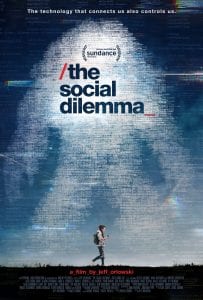
The poster for Netflix’s “The Social Dilemma.”
The film – to my mind, with a clear and unfortunate one-sided agenda and interview scope — explores the rise of social media and the damage it’s caused to society.
It focuses on what it calls the exploitation of its users for financial gain through surveillance capitalism and data mining; how its design is meant to nurture an addiction, its use in politics, its impact on mental health (including the mental health of adolescents and rising teen suicide rates), and its role in spreading conspiracy theories and aiding groups such as flat-earthers and white supremacists, according to Wikipedia.
The film features interviews with many passionate, smart subjects, who seem uniformly to be former employees of tech titans like Google, Facebook, Twitter and Pinterest:
- Former Google design ethicist and Center for Humane Technology co-founder Tristan Harris
- Center for Humane Technology co-founder Aza Raskin
- Asana co-founder and Facebook‘s like button co-creator Justin Rosenstein
- Harvard University professor Shoshana Zuboff
- Former Pinterest president Tim Kendall
- AI Now director of policy research Rashida Richardson
- Stanford University Addiction Medicine Fellowship program director Anna Lembke
- Virtual reality pioneer Jaron Lanier.
The interviews are cut together with dramatizations starring actors Skyler Gisondo, Kara Hayward, and Vincent Kartheiser, which tell the story of a teenager’s social media addiction. Kartheiser (of “Mad Men” fame) plays three nefarious white guys who are the brain of the AI that rules our devices, which kind of reminded me of the animated characters portraying emotions in Pixar’s “Inside Out.”
The 35-year-old Tristan Harris is the moral conscience of the powerful documentary (which laser focuses on the evil and not the good social media can do). Early on, he notes that the “social dilemma” hinges on our endless apps’ abilities to bring out the best and worst in our society.

Tristan Harris is a former Google ethicist who heads the Center for Humane Technology.
A San Francisco native, Harris started his career studying computer science with a focus on Human Computer Interaction (HCI) at Stanford, while simultaneously working at Apple, where he invented the “Spotlight for Help” feature that is still in use today.
He created a startup called Apture, which was so successful it was acquired by Google in 2011, which is where Harris went to work next. He worked as the Design Ethicist and Product Philosopher, which meant he studied how “digital screens affect users’ behavior, thought patterns, relationships, and general wellbeing.”
By using behavioral science, cognitive neuroscience, psychology, habit-formation, social systems, and ethics, Harris helped invent new designs that “embed mindfulness” into everyday device usage.
This work, among other of his projects, led The Atlantic to call him “the closest thing Silicon Valley has to a conscience” in a 2016 piece about how mobile devices are designed to be as addictive as possible.
After Google, Tristan founded a movement called Time Well Spent, to “rapidly coordinate change in how a handful of technology platforms hijack two billion people’s minds in the name of capturing attention.”
In addition to that, Harris also co-founded The Center for Humane Technology, where he asks industry insiders to “re-align technology with humanity’s best interests.”
One of the many cataclysmic truth bombs he drops in “The Social Dilemma” is chilling – “If you’re not paying for the product, then you are

‘The Social Dilemma’ is disturbing and provocative.
the product.”
Since Google, Facebook and Twitter are free for people to use, it’s the advertisers that are the true customers, and we’re apparently being manipulated to serve their needs. They are buying our time and attention. The film cleverly alludes to the fact that the only businesses that have “users” are illegal drugs and computer software.
Maybe it’s just me, but unlike YouTube (and Spotify before I blessedly bought Premium), you don’t need to wade through ads before using these social media, online tools. The account holders have control over what they post on social media and like any business that ever existed, companies are free to advertise for our attention and almighty dollar, but we are the ones who have the choice to buy or not.
“The Social Dilemma” – especially in the portrayal of the addled, almost abducted teen boy – makes us out to be easily controlled dupes. Really? I know the addict is the last to admit he has a problem, but still.
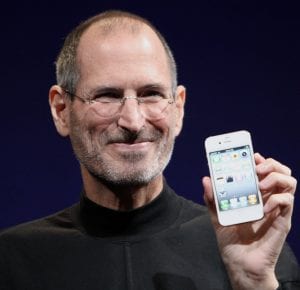
Former Apple CEO Steve Jobs in 2010.
Other great quotes among the experts in the doc:
- ”Any sufficiently advanced technology is indistinguishable from magic.”
- ”It’s the gradual, slight, imperceptible change in our own behavior and perception that is the product.”
- ”Social media is a marketplace that trades exclusively in human futures.”
- ”The very meaning of culture is manipulation.”
- “If everyone is entitled to their own facts, there’s no need for compromise, for people to come together, no need for people to interact.”
- “If we don’t agree on what is truth, we’re toast.”
- “These services are killing people.”
- “Processing power has increased by a trillion times, while our brains have evolved not at all.”
- “I don’t hate them. I just want to reform them, so they don’t destroy the world.”
Social media, streamers by the numbers
There’s no doubt, more of our eyeballs are glued to our screens, across many formats. The volume of smartphone owners worldwide has jumped by a billion just since 2016, to 3.5 billion, including 260 million in the U.S.
There are over 2.6 billion active Facebook users globally, 190 million in the U.S. Even if you just had to pay $5 month for the service, the social behemoth could generate $36 billion a year.

The first iPhone was released in 2007.
Don’t feel bad for them – Facebook’s ad revenue is projected to be $31.4 billion this year, up from $23.7 billion in 2018. Twitter has over 152 million users worldwide, including 62.5 million in the U.S.
There are now 1 billion Instagram users (five times more than 2014), with 120 million in the U.S.
Netflix (which of course does charge subscribers, in exchange for ad-free content) has added over 25 million subscribers since the pandemic started. There are more than 183 million subscribers globally, with about one third in North America. Over 50 million Americans subscribe to Amazon Prime Video and Hulu has over 35 million subscribers.
Disney Plus (which launched last November) passed 50 million members in April, and now has about 61 million subscribers. I was among ones that got a month-long Disney Plus in July to watch “Hamilton” – paying $7 for a family of four, which naturally is a far more affordable option than the theater (which is closed anyway), and I screened many other films over that time.
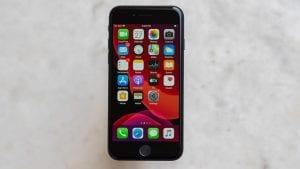
The iPhone SE is a popular top-of-the-line model.
Amazon Prime Video accrued the most new subscribers among the competitive streaming video-on-demand services in the second quarter, according to analytics firm Kantar’s quarterly Entertainment On-Demand reports (per TheWrap).
Prime Video subscriptions accounted for 23% of those subscriptions in Q2, a sharp increase from its previous 14% last quarter. For comparison, Netflix added a Q2 record 10 million subscribers last quarter to increase its worldwide total to north of 190 million.
Prime has 150 million global subscribers, and a 2017 Reuters report revealed then 26 million American subscribers used Prime Video. (Hello, “Marvelous Mrs. Maisel”!)
Of course, ease and affordability are an undeniable draw to access home entertainment and social media on our devices. And their use has obviously surged as many people have been working from home or otherwise quarantined since March.

Amazon Prime’s numbers have skyrocketed during the pandemic.
An article at business.com said July 2020 saw a rise of 10.5% in social media usage, compared with July 2019, according to a GlobalWebIndex survey. Some 46% of women and 41% of men said they’ve spent more time on social media during the pandemic, making it the second-most popular digital activity.
As they spend their lockdown time online, consumers are moving onto new platforms and discovering entertainers and brands they hadn’t noticed previously, the story said, noting the rise of TikTok.
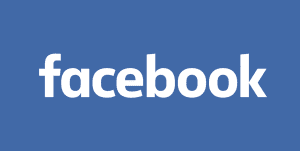
There are over 2.6 billion active Facebook users globally, 190 million in the U.S.
What sets it apart from other social media channels, is that it encourages users to tap into their own creativity by making their own content and riffing off of existing videos. TikTok added over 12 million unique U.S.-based visitors in March 2020 alone, crossing the 2 billion download mark in April.
A June article at emarketer.com said as consumers started spending more time at home in the spring, they used social media more – an average of 82 minutes a day in April, compared to 66 minutes a day in 2015. (That’s nothing compared to me now.)
Depending on the research source, up to 51% of U.S. adults are using social media at higher rates during the pandemic.
Of 2019 data according to Apptopia:
- The average American spends close to three hours a daywith his/her smartphone, with 90% of that time devoted to apps, according to eMarketer.
- In 2019, for the first time, people in the U.S. watched their smartphones more than they watched TV.
- In 2019, adults in the U.S. spent over 30 minutes a day watching videos through smartphone apps.
- Between 2017 and 2021, time spent watching video through apps is expected to rise 27%.
A New York Times story in April (on how the virus changed the way we Internet) noted an analysis of U.S. online use from SimilarWeb and Apptopia, two online data providers, reveals that our behaviors shifted — sometimes starkly — as the virus spread and pushed us to our devices for work, play and connecting.
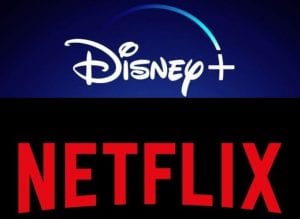
Disney Plus and Netflix have taken off in popularity during covid.
With nearly all public gatherings called off, it said Americans have sought out entertainment on streaming services like Netflix and YouTube, and looking to connect with one another on social media outlets.
Despite “The Social Dilemma” painting an unrelentingly dark picture of AI’s influence, its very valuable website is more balanced. In one section on the FAQs, regarding positive aspects of social media, it says:
“There are countless positive things that have come from social media, and many more positive things will continue to come from it. But our point in the film is less about any one issue or campaign, but about the system as a whole. Regardless of whatever issue you personally care about, there is another countering perspective that is also being algorithmically pushed on these platforms.
“For years, we have only been hearing the positive aspects as broadcast by the platforms themselves. The promise to keep us all connected has given rise to many unintended consequences that we are now seeing on a global scale. By focusing the film on how these technologies prey upon human weaknesses, we can shine a light on the devil’s bargain we’re forced to make when using these platforms and create the
collective will to change them.”
History has its eyes on new tech
Of course, Americans since the nation’s founding have been drawn to new technologies and their promise of positive transformation.
Few people know more about how tech has influenced our inner lives more than my talented sister-in-law, Susan Matt — Presidential Distinguished Professor of History at Utah’s Weber State University, whose specialty is the history of emotions.
Last year, she and her husband, Luke Fernandez (Assistant Professor in Weber State’s School of Computing and co-director of the Tech Outreach Center) released the book, “Bored, Lonely, Angry, Stupid: Changing Feelings About Technology, From the Telegraph to Twitter” (Harvard University Press).
My Amazon review of the 464-page book said it’s astoundingly ambitious and illuminating, as they take on what could easily be four books worth of history, spanning three centuries of American innovation and progress across momentous changes in technology.
They not only display tremendous prowess in organizing and synthesizing these major inventions and improvements over time, but graceful thought and sensitivity in revealing how technology has impacted ordinary Americans, across a diverse demographic of people yesterday and today. While sweeping and awesome in its scope, this is a quick, fascinating read, and the reader is rarely left bored, lonely, angry or stupid with this sympathetic pair as helpful, patient guides.
My only quibble was that the section on anger and how TV, radio and social media have fomented our hyper-partisan divides, the role of Fox News and other right-wing outlets is too lightly explored.
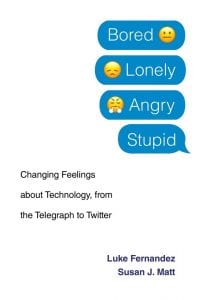
The cover of “Bored, Lonely, Angry, Stupid.”‘
The authors set out to answer six questions:
- Is social media making people narcissistic?
- Is the Internet causing loneliness?
- Have digital devices made individuals incapable of enduring boredom?
- Are people losing the ability to concentrate in an age of ceaseless distraction and multitasking?
- Are they so exposed to digital spectacles that they have become jaded and incapable of experiencing awe?
- Is social media fomenting anger?
Except for the second and fifth questions, I’d say the answer to the others would be yes.
Their fascinating, deeply researched journey shows how advancing technologies have revolutionized our reality as well as our expectations. In the introduction, they write of a teenage girl in 1857 who penned in her diary, “What can’t be cured, must be endured.”
That reflected a belief that some hardships, feelings and conditions could not be resolved or eliminated.
At the time, loneliness and boredom were simply to be expected, part of being human. Americans “expected drudgery and monotony and were not surprised when they encountered tedium,” the authors wrote.
New technologies (including the telephone, radio, TV, etc.) overcome prior societal and human limitations, and we increasingly believe we can have “easy and infinite social connections, endless diversion and stimulation, unceasing affirmation” of our worth, and “boundless intellectual capacity,” the pair wrote.
Fernandez said by e-mail this week: “We should acknowledge the many ways 21st century communication technologies have eased the burdens of the epidemic. We talk of masks and vaccines and PPE as the primary technologies that mitigate the virus. And that’s fine. But what about Zoom?

Susan Matt teaches history at Weber State University.
“Shouldn’t it too be included?” he said by e-mail. “Without it, many of us (or at least those of us who work primarily with media) would have been forced back into our offices and become vectors for the transmission of the virus. So it’s been a godsend of sorts. Or more aptly, a Silicon Valley send.”
“So anything less sanguine that we say about social media in the age of Covid shouldn’t be said without making reference to this larger more rosy backdrop,” Fernandez said. “Which isn’t to say that there aren’t some things to wax negative about. And what are these?
“One worth highlighting is the way that social media in the age of Covid is further amplifying division, political polarization and ramping up anger,” he said. “By now, practically everyone knows the way that social media has diminished the reach of the public square and funneled us into silos or bubbles that make us less able to understand appreciate or tolerate other political points of view.”
“But has anyone thought about how Covid in concert with social media might be compounding those effects?” he asked. “Before Covid, at least we had the option to venture into semblances of the public square — to meet people face to face. But with Covid and social media together, the chances of finding others to connect with in person, let alone others who are different than us politically become slimmer and slimmer.
“We might bond, but we rarely bridge,” Fernandez said. “Which means perhaps that we are on our way to becoming totally and irremediably politically screwed – until that next godsend comes in the guise of a vaccine.”
Matt said Covid has intensified our relationship with our phones, computers, social media, and video conferencing.
“We seem more addicted than before. For those who are social distancing, there may not be that much going on in daily life,” she said. “We’re turning ever more to our phones for entertainment and excitement. We’re finding out that when it comes to enduring dull times, we don’t have the same skills our ancestors did; our toleration for boredom has decreased.
“Our use of tech during Covid may also be making us focus more on cultivating particular online identities, since our face-to-face interactions are declining,” she said. “It may make us more obsessed with how we look to others, how our ‘personal brand’ is faring online.”
Despite her expertise, Matt doesn’t use social media much at all.
“My big addiction — which has grown during Covid — is email and ‘doomscrolling’ on news sites,” she wrote. “I have tried to keep saying to myself ‘Life is short. Do you want to spend it in front of a computer screen?’ Sometimes this motivates me to turn it off, but alas, not always.”
What did she think of “Social Dilemma”?

Luke Fernandez is assistant professor at the Weber State computing school.
“I thought it was a pretty good look at the problems social media is causing –the alienation, the polarization, the despair (at times),” Matt wrote by e-mail. “I think the one point where Luke and I, as well as a bunch of tech scholars would take issue with the film, is with the idea that this is the first time technology has worried us.
“Tristan Harris makes this point, in an effort to underscore the seriousness of the present moment. He’s right — today we are faced with a crisis that has resulted in large part from Silicon Valley’s creations. But other generations worried about past technologies — the telegraph, the telephone, the phonograph, the radio, and certainly the TV.
“We don’t point these past worries out to reassure ourselves that everything will turn out OK or to say that past generations were wrong or silly to worry,” Matt said. “Instead, we point to those past anxieties to suggest that we, like our ancestors, need to be cautious and careful and thoughtful about how we want to integrate particular tools into our lives.
One point they make in the book (which includes many interviews with a diverse population across the country), is that on Facebook and Twitter, cyberbullying and hate speech have soared and many people lash out in ways they may never do if they saw that person face to face.
However, the overpoweringly depressing and disgusting presidential debate Sept. 29 showed how President Trump has literally put the “bully” in his bully pulpit. He’s an infamously prolific Twitter user (with over 86 million followers), and he hardly moderates his manners at rallies or his vitriolic debate “shitshow” (as described by CNN’s Dana Bash).
Social media and mental health
Someone who was similarly sickened by that was Haley DeGreve, a suicide prevention activist and 2020 Augustana College grad.
“Someone very close to me said, you have two ears and one mouth for a reason,” she said Friday. “Listen more and talk less. I’ve always tried to live by that. If you want to understand people, you have to listen. I was so disappointed in the debate, it felt like there was no question that was answered at all. It was ridiculous.”
DeGreve also was disappointed that there was zero mention of mental health in the questions.
“Trump attacked Biden’s son for his addiction problem,” she said. “There’s no need to politicize Covid, because people are dying. There’s no need to politicize addiction, because we have an addiction problem in this country. Why are we politicizing any of these super important issues that are killing people?”

Haley DeGreve, a suicide preventioon advocate, does social media for Foster’s Voice and The Gray Matters.
“As an advocate for suicide prevention and mental health awareness, it’s always frustrating to me, that every year, that is never a topic of conversation,” DeGreve said. “You will never hear a candidate for president to talk about suicide, which is really frustrating, because it’s the second-leading cause of death for young people in this country.”
She said there is a lot of good that comes from social media (which can both connect and control people), but it’s a delicate balancing act.
“I think right now, it’s very difficult because we want news and information about politics, Covid, things that are going in the world. People really want that information and I think it can be a good tool in a positive way, if you’re putting out helpful things,” DeGreve said.
“It can be a damaging thing as well,” she said. “I can’t imagine it’s great for your brain to be on your phone all the time, but it’s one thing to say that and another thing to practice it. I’m just as guilty of it – I spend a lot of time on my phone because I’m running the Gray Matters social media account, the Foster’s Voice social media and my own social media.
“It’s hard to set boundaries and parameters around that,” DeGreve said. “It’s kind of how our world is operating, in the virtual realm.” On her personal pages, she has 3,696 Facebook friends and 2,151 Twitter followers.
“It’s hard right now to put boundaries on social media, because that’s the way the world is,” she said. “It’s important to filter your news feed to be appropriate for you, coming from a mental health perspective. You want to make sure you’re not following accounts that might be really triggering to you, or if you see a post that maybe you need to mute that person if it’s damaging to your mental well-being.”
“Sometimes I’ll have to step back from my phone or mute that person or that account,” DeGreve said. “Or try to make it so my feed is informational but it’s not going to be damaging. There’s a fine line between getting information from the other side of what you believe and making sure it’s not going to be adding extra stressors you really just don’t need right now. Our world is in such a state that a lot of people are suffering from mental health problems, isolation, different things that might trigger their mental well-being.”
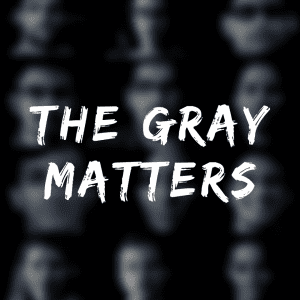 For people who grapple with depression and anxiety, being isolated now more than ever, does social media make their issues better or worse?
For people who grapple with depression and anxiety, being isolated now more than ever, does social media make their issues better or worse?
“It’s difficult, especially if you’re someone struggling, who’s looking for that support, it can be really challenging to find that online,” DeGreve said. “We really do need face-to-face interaction. When we have these platforms, they do provide a lot of help, but at the end of the day, everyone needs that face-to-face community, interpersonal interaction. Sometimes, it’s hard to do that through a screen.”
For someone trying to help, it’s also hard, she said, noting she sometimes gets calls from people in the middle of the night, having to talk it through with them. “You can’t always be available 24/7,” DeGreve said.
“It’s very hard to be always on your phone, always be connected to people,” she said. “Our brain needs a break from that stuff. It’s a really challenging situation overall. It provides this really complex dynamic between prioritizing your self-care, your mental health, but also being connected through virtual services now that is the only way we can connect with people.”
“I’m OK not having my phone on me, because it provides a sense of peace,” DeGreve said. “I just feel very free. But at the same time, when that power outage happened (in August), I felt very nervous and anxious, not because what I needed, but what other people needed. I have a lot of people who rely on me for support, mental health guidance, professional resources.”
“When that happened, I was definitely struggling with that; I was struggling with not being able to see if my family and friends were safe,” she said. “It’s really scary. You also have to ask the question as well – if we really are more connected, does that mean we really are more connected?
“Does text messaging, phone calls, social media, really mean we’re connected on an interpersonal, intimate level?” DeGreve asked. “Or has it become just a highlight reel for other people?”
She and other mental health advocates stress, “You’re not alone,” but if you struggle with depression or other issues, and you’re on social media and see other people’s successes, you feel you’re alone in that, she said.
“We always try to provide viewpoints that there are other people struggling and you’re not alone in that,” DeGreve said. “It’s such a complex issue, especially right now.”
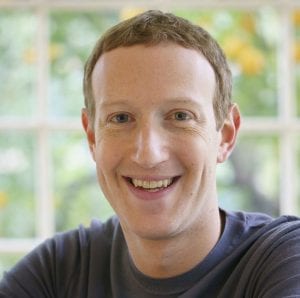
Facebook CEO Mark Zuckerberg.
“There is definitely a positive side to social media, where you post something and see all the ‘likes’ and retweets,” she said. “On my platforms I try hard to provide transparency in how I share my struggles because I want to validate other people’s emotions and well-being too. We can struggle in this together, even though we can’t be sitting next to each other, supporting each other. We can still try to do that in virtual connections.”
She and others in the Netflix doc push for better transparency and regulation of tech giants, like other public utilities are regulated. People need to be better aware of a social-media platform’s terms and conditions of use, DeGreve said.
Battling a storm of misinformation
Everyone seems to agree social media makes it so much easier for misinformation to spread quickly, and Trump has been both a bullhorn proclaiming “fake news” at the drop of a hat, and source of a tsunami of lies.
DeGreve noted she’s seen posts that more people have died of suicide in August than from Covid, which simply isn’t true.
She supports suicide awareness, but there’s no credible source for that statistic, she said. The American Foundation for Suicide Prevention hasn’t even released its 2019 statistics, let alone 2020. In 2018, 48,344 Americans died by suicide, and this year, over 208,000 have died so far from Covid-19.
A CNN piece in May said popular social media posts are filled with inaccuracies about science. They could damage public health during this pandemic, the authors of two separate studies said in the spring.
One study found that more than one in four of the most popular YouTube videos about the novel coronavirus contained misinformation. Another found that vaccine skeptics were winning the battle for Facebook engagement.
More than 70% of adults turn to the internet to learn about health and healthcare, a team of researchers in Canada said. They analyzed popular YouTube videos on a single day earlier this year, filtering for those that mentioned coronavirus.
A Vox story Oct. 1 said that after months of working with Facebook to safeguard the 2020 election, several national Democratic Party leaders say the company failed to meet promises to stem the tide of misinformation spreading on its platform.

Misinformation regarding politics, science and the presidential election runs rampant on social media.
If the election’s results are contested after Nov. 3 — which is an acute concern since a surge in mail-in ballots is expected to delay the count and President Trump has refused to commit to a peaceful transition of power — they worry that Facebook is utterly unprepared to prevent people from using its platform to spread chaos, the story said.
Recode spoke with four sources with direct knowledge of ongoing monthly private conversations about election misinformation between several senior Democratic party committee leaders and senior members of Facebook’s policy team.
Democratic sources told Recode that monthly calls with Facebook that started in May have been “maddening” and have left party members “banging their head against the wall.” They say Facebook employees in these meetings — while seemingly well-intentioned — have failed to stop the spread of misinformation attacks against Democratic candidates, been reluctant to share information about extremist groups encouraging voter suppression, and appeared “flat-footed” in their plan for dealing with conflicting information about the election results.
Facebook spokesperson Tom Reynolds said that Facebook has been proactive in working with party leaders on both sides of the aisle about stopping abuse of its platform ahead of the election and that this is a top priority for the company, Vox reported.
“Elections have changed and so have we. Since 2016, we’re the only tech platform to build a global fact-checking network of over 70 fact-checkers. We have disrupted more than 100 coordinated inauthentic behavior networks and have hired 35,000 people to work on enforcing our policies and keeping the people on Facebook safe,” said Reynolds.
Twitter said last month that it will label or remove posts that prematurely declare victory in the upcoming U.S. election, making it the latest social media company to set out a plan for a prolonged vote count and a president who appears primed to dispute results if he does not win,
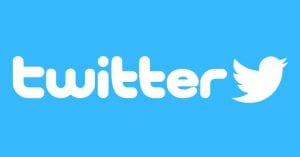
Twitter has had to remove several posts for being factually inaccurate and spreading disinformation.
according to Politico.
The social network’s rules currently prohibit a narrower set of election-related tweets, including posts that stoke confusion about how to vote and other forms of voter suppression. And the platform in recent months has flagged some tweets by President Donald Trump and his allies that contained misleading information about mail-in voting.
But under its new guidelines, Twitter will slap warning labels or take down posts “claiming victory before election results have been certified” or seeking to “prevent a peaceful transfer of power,” the company said in a blog post. And Twitter will take the same action against “disputed claims” about the electoral process, including “unverified information about election rigging, ballot tampering, vote tallying, or certification of election results.”
Twitter spokesperson Trenton Kennedy said the rules change is meant to both expand the range of misleading election-related tweets the company will act on and make more explicit what kind of posts will trigger action from the company.

New York Times columnist Jamelle Bouie.
A September New York Times column by Jamelle Bouie (“Facebook Has Been a Disaster for the World”) noted for years, Myanmar’s military used Facebook to incite hatred and genocidal violence against the country’s mostly Muslim Rohingya minority group, leading to mass death and displacement. It took until 2018 for Facebook to admit to and apologize for its failure to act.
Two years later, the platform is again sowing the seeds for genocidal violence, the column said. This time it’s in Ethiopia, where the recent assassination of Hachalu Hundessa, a singer and political activist from the country’s Oromo ethnic group, led to violence in its capital city, Addis Ababa.
This bloodshed was, according to Vice News, “supercharged by the almost-instant and widespread sharing of hate speech and incitement to violence on Facebook, which whipped up people’s anger.” This follows a similar incident in 2019, where disinformation shared on Facebook helped catapult violence that claimed 86 lives in Ethiopia’s Oromia region.
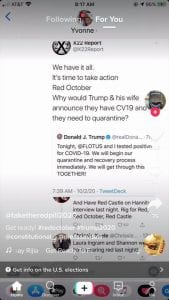
Just this week, TikTok users disseminated a popular QAnon theory that Donald Trump didn’t actually have coronavirus and his saying so was a front for him exposing a shadowy cabal of pedophiles.
“Facebook has been incredibly lucrative for its founder, Mark Zuckerberg, who ranks among the wealthiest men in the world. But it’s been a disaster for the world itself, a powerful vector for paranoia, propaganda and conspiracy-theorizing as well as authoritarian crackdowns and vicious attacks on the free press. Wherever it goes, chaos and destabilization follow,” the columnist Jamelle Bouie wrote.
In the U.S., Facebook has been used by QAnon, a conspiracy theory in which President Trump struggles against a global cabal of Satan-worshipping, life-force sucking pedophiles and their enablers. “QAnon supporters believe Trump will eventually go public in an operation that ends with the arrest, internment and execution of that cabal, which conveniently includes many of his Democratic political opponents,” the column said.
Facebook, according to the company’s own investigation, is home to thousands of QAnon groups and pages with millions of members and followers. Its recommendation algorithms push users to engage with QAnon content, spreading the conspiracy to people who may never have encountered it otherwise.
“The Social Dilemma” makes similar arguments. Where is the line between free speech and fraud, between self-control, choice, and being manipulated? It’s sometimes hard to see.
Why watch film and TV on a small screen?
I watch so much content on YouTube (Stephen Colbert, Seth Meyers, MSNBC), Netflix (just binge-watched “Schitt’s Creek” again), Twitter, Facebook and Apple News, partly because I’m an absolute news junkie, and I am often bored, lonely, angry (and at times stupid).
This awful pandemic has forced of us to spend way more time alone than we’re used to, but I have always been an introvert, and I love keeping in touch with people, and checking out the latest in TV and movies.
And given Covid, many theaters and artists have been forced to put their art online, because that’s where people are – many are not going out, and for months, the physical arts and culture world was literally shut down. We not only check in with our usual suspects online and on social media, we’re keeping up with our favorite artists and discovering new ones.
It’s become so convenient that River Music Experience chief Tyson Danner recently told me he’s afraid people will want to keep livestreaming or just streaming in general, after society reopens fully. Live-music venues may be the last to reopen, but he and I agree there literally is nothing like the experience of seeing a concert, stage show or film with lots of other people at the same time.
That communal experience – especially in the live show that may be different each night – is inexpressibly important and must be cherished.

Tyson Danner, executive director of River Music Experience
Artists need audiences and audiences need artists. It’s two-way nourishment and fulfillment, and if you’re just watching a concert or musical alone in your room, you’re missing out on so much.
Last fall, legendary film director Martin Scorsese said the rise of streaming platforms was “an even bigger revolution than sound brought to cinema” because it “opens up the original conception of what a film is” and how it should be seen.
Scorsese told reporters he thought it was still important that movies be experienced communally.
“Homes are becoming theatres too, but it’s a major change and I think one has to keep an open mind,” he said.
“The Irishman” — a three-hour epic about the reflections of a former Jimmy Hoffa associate and hitman — premiered in limited theatrical release last Nov. 1 before its Nov. 27 release on Netflix. It earned 10 Academy Award nominations.
Scorsese took the project to Netflix after other studios turned it down, partly due to its length and the expensive de-aging digital effects used to make stars Robert De Niro, Al Pacino and Joe Pesci appear decades younger. Netflix has produced three Best Picture nominees – “Roma,” “The Irishman” and “Marriage Story” – among its hundreds of award nominations and wins.
“Roma” earned three Oscars and “Marriage Story” got Laura Dern a Best Supporting Actress statuette.

The poster for Martin Scorsese’s “The Irishman.”
In January 2014, Netflix and Robin Wright in “House of Cards” made history at the Golden Globe Awards, by becoming the first streaming platform to be nominated and the first actress for a web TV program to win the award, respectively. Netflix was also the first high-profile streaming service to earn an Academy Award nomination.
Documentary filmmakers Kelly and Tammy Rundle of Moline-based Fourth Wall Films enjoy watching movies at home, but on as large a screen as possible.
“We always designed our films visually to be effective on a television or onscreen in a movie theater. I know that if someone watches our films on a small screen handheld device, a lot of visual material that we have intentionally and meaningfully layered into the presentation will be lost,” Kelly said Friday.
“We know that some younger viewers are watching our movies on smart phones, and we’ll have to factor that

Moline filmmakers Tammy and Kelly Rundle.
reality into our production design going forward.,” his wife Tammy said. “Personally, watching a movie on a small device is not appealing to either of us.”
Kelly said that social media overall “has the capacity to do great good, and great evil. Because of the potential for ‘evil,’ it should be regulated so users have some degree of protection” he said. “Large corporations that are not subject to oversight often engage in activities that harm people and the environment. The current tech industry is not doing enough and needs to be more responsible.”
I know “everything in moderation” is a key rule that can be applied to smartphone use. My two computer-savvy sons encouraged me to use the “Screen Time” control on my phone, by which you can set the amount of time to limit your use of each app. Even allotting four hours a day as a limit has been a challenge.
I’m decades from my teen years, but I always tell people, I was born premature and I have yet to fully mature. I miss people – at least I can live vicariously through the screen.
Thanks, Steve Jobs, iDrug dealer.









